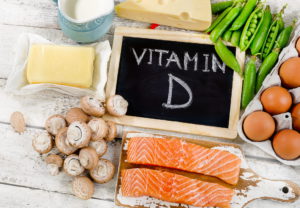
Are you getting enough sun? We have been told for years to stay out of the sun or cover ourselves with UV blocking sunscreen. So how do we get enough vitamin D?
Vitamin D or the ‘Sunshine vitamin’ has developed notoriety recently. You may have heard about the benefits of good vitamin D levels in the face of a Covid-19 infection. Well, vitamin D has so many functions in the body, and research shows that it’s a hugely important nutrient for a strong immune system, autoimmunity, diabetes, depression, chronic fatigue as well as being good for our bones and preventing osteoporosis.
So, why might you need to take vitamin D supplements if you spend time in the sun?
Surprisingly, it is estimated that over 1 billion people worldwide are deficient.
Why are we so deficient?
-
- Our modern lifestyles often require us to spend more time indoors or in offices
- Over-utilisation of sunscreens when we do go in the sun blocks the UV rays from being absorbed
- Living in northern latitudes where the angle of the sun provides insufficient levels and is only effective for about 4-5 months of the year
- Ageing, which slows down our conversion and absorption ability
- Our western diet typically lacks vitamin D rich foods
- Gut inflammation reduces absorption
- Stress and obesity also contribute to vitamin D deficiency
- Those of us with a darker skin, will absorb less vitamin D from the sun
- Additionally, the sunshine vitamin needs to be converted by our liver and kidneys into its most active form, calcitriol. This requires enzymes, which need to be made by our DNA, but genetic mutations, which are quite common, can further deplete our levels.
Vitamin D comes in 2 different forms – ergocalciferol or vitamin D2 which comes from plants, and is less potent that cholecalciferol or vitamin D3, which comes from the sun’s UV rays as well as from animal products.
Whilst toxicity is rare, you should ideally test your vitamin D levels before supplementing. It is a fat-soluble vitamin that we store in our bodies – so you can get too much, possibly explaining the nasty effects of sun stroke. Testing the levels in your blood (serum 25-hydroxy D test) is advised, before supplementing.
So, what does vitamin D do for us?
Calcium and Bones
A key function is to regulate calcium and phosphorous metabolism and support normal calcification of bones. You need vitamin D, to increase calcium absorption from the gut and for the storage of calcium in bones and teeth, it also helps to decrease calcium excretion from the kidneys. Vitamin K2 has a synergistic action with vitamin D, so is needed to push calcium into the bones, instead of calcium building up in the arteries causing calcification.
Key Point: Vitamin D is the secret ingredient for good bone health and to prevent osteoporosis in menopausal women. Without it, calcium is not as effective in supporting bone density.
Muscles
Vitamin D receptors are found in muscle cells, and studies have shown that elderly people with higher levels have increased muscle strength and suffer from fewer falls. A deficiency may also cause chronic unexplained musculoskeletal pain.
Immune System function
There has been a lot of focus recently on the importance that vitamin D plays in our immune system. And in current times it’s proving to be a lifesaver for many people. Studies have shown a far better outcome in Covid-19 infections and hospitalisations for people who had higher levels. This is because vitamin D is crucial for activating our T-cell immune defence. In fact, almost all severe cases and deaths relating to Covid-19, have highlighted a severe vitamin D deficiency.
“After studying global data from the novel coronavirus (COVID-19) pandemic, researchers have discovered a strong correlation between severe vitamin D deficiency and mortality rates.”
(Science Daily, May 2020)
Autoimmune conditions
We already know that vitamin D deficiency is a key factor in the onset of multiple sclerosis. But it’s actually quite common in most autoimmune disorders such as lupus SLE, rheumatoid arthritis and ankylosing spondylitis. Research has found vitamin D deficiency is common in people with these disorders.
Which foods contain vitamin D?
 Vitamin D is found mostly in organ meats, liver, oily fish such as salmon, sardines or mackerel, cheese, butter and egg yolks.
Vitamin D is found mostly in organ meats, liver, oily fish such as salmon, sardines or mackerel, cheese, butter and egg yolks.
The only good plant source of vitamin D is mushrooms, which provide vitamin D2, rather than the more potent vitamin D3. So if you follow a vegetarian diet, and don’t get enough sun then you should check your levels and consider supplementing.
How much do I need?
There is mixed research on the optimum levels of Vitamin D, now suggesting that the level set by the Food and Nutrition Board (800 i.u per day) is far too low. New guidelines suggest that regular supplementation of 2,000 – 4,000i.u per day during the winter months will maintain adequate levels, especially if you live in the northern hemisphere. However, if you are deficient after testing, i.e < 80-100 nmol/L (or < 40-65ng/mL), then a daily dose of 5,000 – 10,000i.u per day will help to elevate levels to normal. This is in fact more in line with the vitamin D levels that we make from sunlight.
NOTE: Look for Vitamin D3 + K2 if you are going to supplement. As D3 (cholecalciferol) is the more active form of vitamin D, and vitamin K2 (100 – 200 µ.g) increases its absorption from the gut. Alternatively, you can get vitamin K2 from dark green leafy veg, and it’s also made in the gut by a healthy gut microbiome.
To get your levels checked and see if you need to supplement – contact Kate at Kate Lee Nutrition





0 Comments